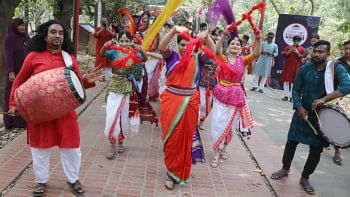Growing climate-resilient crops imperative: speakers
For a number of years, rice cultivation in haor areas, which account for one-fifth of the total rice production in Bangladesh, has been bearing the brunt of climate change.
To tackle this, rice growers in the haor regions need short-duration, cold-tolerant and high yielding varieties, said Additional Agriculture Secretary Kamalaranjan Das.
He made the remark at an online workshop, organised by International Rice Research Institute (IRRI) yesterday.
A new five-year research project -- "Development of Short-duration Cold-tolerant Rice Varieties for haor Areas of Bangladesh", funded by Krishi Gobeshona Foundation (KGF), was launched at the workshop.
Bangladesh Rice Research Institute (BRRI) is a partner of this project.
The additional secretary said this new project would help bring a positive change in the lives of the haor people and also contribute to food and nutrition security.
Boro paddy is the main crop in haor areas. But almost every year, flash flood in April caused by heavy rainfall in the upstream submerge almost the entire Boro yield in this region. The Boro season usually begins in mid-November, but many farmers start sowing in late October to avoid flash flood.
BRRI Director General Md Shahjahan Kabir said population of Bangladesh is increasing at the rate of 1.37 percent per year, but arable land is decreasing at 0.4 percent.
He said the global climate change has been continuously challenging the country's food security.
Saying that there is about 1.26 million hectares of cultivable land in the northeastern haor areas where farmers can grow only one crop every year, the scientist said flash flood often damages that only crop, putting Bangladesh's food security in jeopardy.
"That is why BRRI and IRRI have been trying to develop cold and submergence tolerant varieties. With this aim, BRRI has already collected germplasms from South Korea, Nepal and Japan and have finished their characterisation," he added.
KGF Executive Director Dr Jiban Krishna Biswas said Boro rice is faced with two adverse conditions in the haor areas.
"This project is expected to develop varieties that could stand up to these adverse conditions -- low temperature and flash flood - and also give high yield," Biswas said.
IRRI Director General Dr Mathew Morrell said the critical climactic challenges that the haor areas in Bangladesh face are going to intensify in the future due to the global climate change.
"So, developing cold tolerant, short duration and high yielding rice varieties is an imperative for building resilience," he added.
IRRI's Head of Plant Breeding Division Dr Hansraj Bhadwaj, South Asia Representative Dr Nafees Meah and Bangladesh Representative Dr Humnath Bhandari were present at the workshop, among others.

 For all latest news, follow The Daily Star's Google News channel.
For all latest news, follow The Daily Star's Google News channel. 



Comments